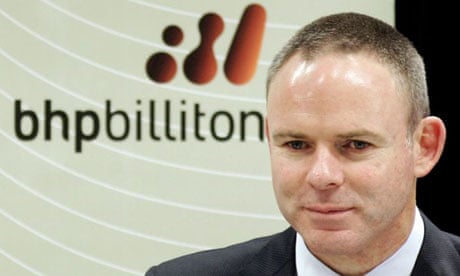The BHP Billiton chief executive Marius Kloppers is resigning after the world's biggest miner on Wednesday posted a 58% fall in half-year profit.
Kloppers, who has run the Anglo-Australian company for six years, will be replaced on 10 May by the chief executive of its non-ferrous metals division, Andrew Mackenzie, 56.
The announcement came as the Anglo-Australian company reported its profit before one-off items tumbled to $5.68bn for July-December 2012 from $10bn a year earlier and took $3bn in writedowns on its aluminium and nickel businesses.
Mackenzie, whom Kloppers wooed from rival Rio Tinto in 2008, will take the reins at a time when the company is battling to protect margins by cutting costs amid weaker commodity prices.
BHP's shares rose nearly 1% percent to a 17-month high of A$39.34 after Mackenzie's appointment before dipping slightly in a flat overall market.
The timing of Kloppers's exit was a bit sooner than expected, even though the company flagged last November that it was looking for a new CEO. Kloppers, 50, has been in the job for nearly six years and said retiring was a tough decision.
He joins the fallen chiefs at BHP's rivals Rio Tinto, Anglo American and Xstrata, which have all chopped heads after they splashed out on expensive projects and acquisitions and allowed costs to get out of control in the boom years.
Kloppers won kudos for leading BHP through the global financial crisis in much better shape than its peers but disappointed investors with his expensive bid for shale gas assets in the United States, which led to $2.8bn in writedowns and cost him his bonus for 2012.
Mackenzie, a prizewinning scientist who grew up in an industrial town near Glasgow, was at BP before he entered the mining industry, giving him crucial experience in the key commodities BHP has targeted for growth as it looks to make itself less dependent on iron ore.
"He's a rare executive because he has experience in both the oil and gas, petrochemicals and minerals areas of this business. And that fits us perfectly," said the BHP chairman, Jac Nasser.
Investors and analysts hailed the appointment of Mackenzie, saying the market would welcome his expertise in energy. "The new CEO is coming from a very long career in oil and gas and minerals, especially oil and gas. And oil and gas is a growing proportion of BHP's business. So I think it will be well received by the market," said Mark Taylor, senior resources analyst at Morningstar.
Nasser praised Kloppers for making the company stronger and safer, and for his role in overhauling the global iron ore market to market-based pricing rather than annual contract talks.
"We actually returned more capital to our shareholders during this period than all of the rest of our peers combined," he said, pointing to $36bn in gains to shareholders, including $24bn in dividends.
Kloppers also led the company in three failed takeover tilts at Rio Tinto, Rio Tinto's iron ore business and Potash Corp – deals that fell apart largely as the company had underestimated the concerns of regulators.
BHP said it expected global commodity prices to remain under pressure as new low-cost supplies come into production, even through demand is expected to improve over the next 12 months.
Net profit fell to $4.2bn with aluminium and nickel writedowns offset by gains from the sales of its Richards Bay minerals stake, its Browse gas stake, its diamonds business and the Yeelirie uranium deposit.
BHP raised its interim dividend by 3.6% to 57 cents, also in line with analysts' forecasts.
Rio last week surprised investors with a 15% rise in its dividend despite reporting its first ever loss, hit by $14.4bn in writedowns on its aluminium business and Mozambican coal assets, which cost Albanese his job.
BHP last year shelved $40bn in projects and shut some loss-making coal mines as the whole industry battled with soaring costs, a strong Australian dollar and sliding commodity prices.
In further moves to protect its margins, it said on Wednesday it had cut $944m in costs over the past half year but it did not outline a broader target for cost cuts. That is in contrast with rival Rio Tinto, which plans to cut $5bn in costs by the end of 2014.

Comments (…)
Sign in or create your Guardian account to join the discussion